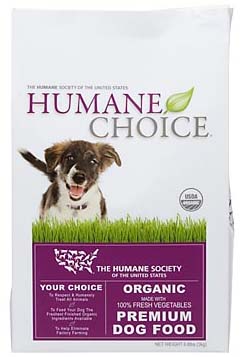Talkback: Vegan Kibble
 After we wrote about HSUS's new private-label brand of vegan dog food, we received an interesting letter from a second-year student at one of the top U.S. veterinary schools. Let's call him "C." We're sharing this story with his permission:
After we wrote about HSUS's new private-label brand of vegan dog food, we received an interesting letter from a second-year student at one of the top U.S. veterinary schools. Let's call him "C." We're sharing this story with his permission:
Dear HumaneWatch:
I am a second year student at [veterinary school redacted] and wanted to comment on your article about "Vegan Kibble." I have classmates that are vegetarians who would not recommend that product to their clients.
Taurine, an essential amino acid found in highest concentration in animal sources, will cause enlarged hearts in dogs and especially cats if it is not in their diet. Humans can synthesize this amino acid but dogs and cats cannot.
Obviously vegan food will not have sufficient resources, even if it is fortified, as that form is not as biologically available to the animal.
In one nutrition class there was a professor that was chuckling because a dog that was presented to her had cardiomyopathy, an enlarged heart, because of Taurine deficiency. The dog was being fed a vegan diet by her owner, a self professed "vegan animal dietitian" who had written numerous books, one titled Feeding your pets without cruelty.
Ironically, her diet was killing her own animals.
Thank you for your continued work,
[Name and contact information withheld at the author's request]
Thanks, C. We are not veterinarians, so we apppreciate the technical/medical point of view. We think we understand: If a dog doesn't get enough Taurine, it develops an enlarged heart. And taurine only comes from animal sources. Correct? (Another animal-doc friend advises me that Lysine, a second amino acid, might present a similar issue.) I'm left to wonder, however, why the National Research Council didn't mention either amino acid by name in its 2006 report, "Your Dog's Nutritional Needs."
It would be fascinating to find out whether "Humane Choice" dog food is somehow supplemented to contain levels of Taurine and Lysine that are similar to those in dog foods made with meat.
We wonder if there's a commercial laboratory that can test for those two. Hmmm…



